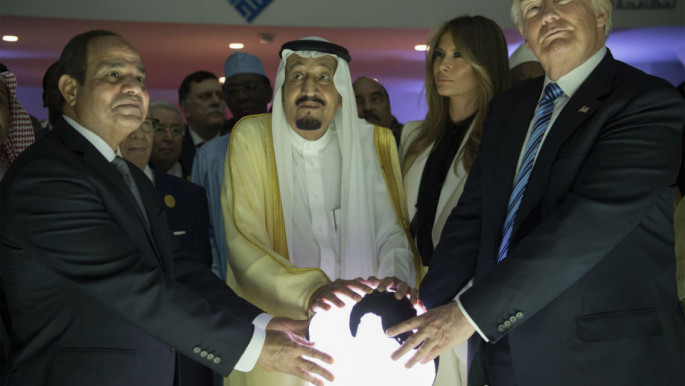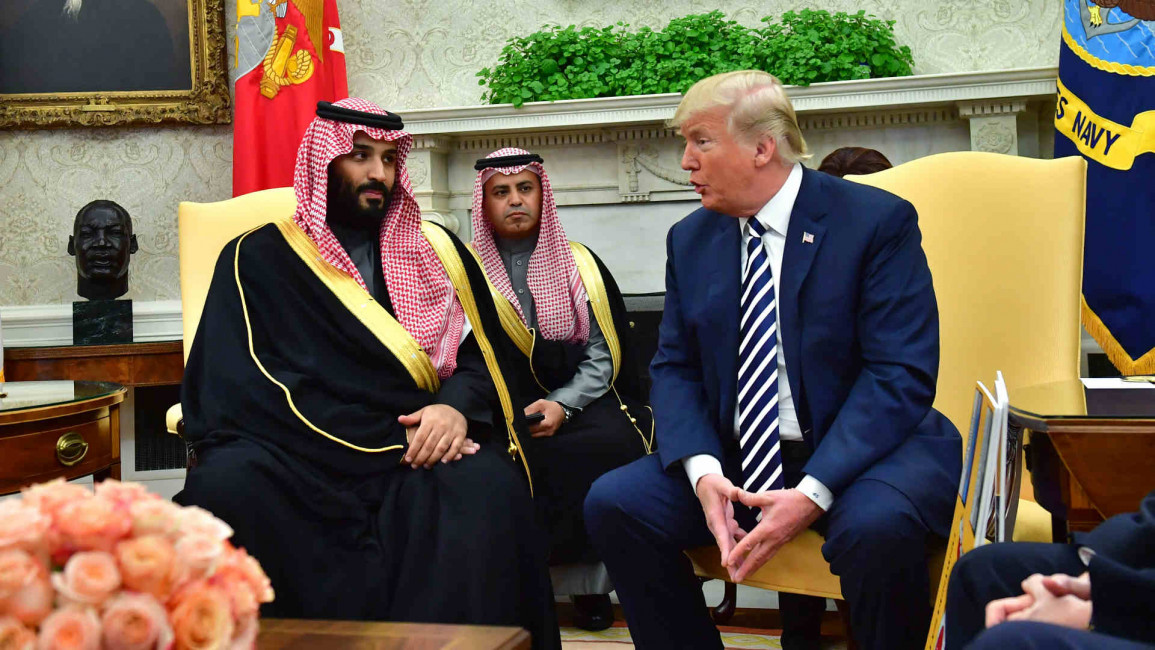
Trump's 'Arab Force' more closely resembles a farce
On Syria, the confused state of American policy persists.
This month, the president, Donald Trump, authorised strikes, in tandem with Britain and France, to punish the regime of Bashar al-Assad for its use of chemical weapons in Douma, eastern Ghouta. That might be taken to suggest that the United States and allies were prepared to act - to restrain brutality, to support stability, and to prevent the eruption of general chaos.
But that impression cannot be sustained in light of what went before and has come since.
At a mass rally - the venue for unprepared speeches in which the president unveils his id - Trump proclaimed that the United States would leave Syria. He said this mere days before he was compelled by his past promises to punish fresh chemical crimes.
Last month, it was reported that Trump had expressed his wish that the US would withdraw from Syria to officials. This was not an off-the-cuff remark delivered to sate cheering adherents. It was a statement of will to those in a position to translate intention into policy.
And despite the later announcement of an increase in the American presence in Syria - notably near Manbij in Aleppo governate - the president's impulses and intentions appear to remain unchanged.
His advisers, therefore, offer him ways to deal with Syria at a distance, involving the minimal possible use of American arms and assets.
This situation has brought forth a new plan of action, one which leaves the hard work to other people. American policymakers have begun to seek support for a strategy which includes the marshalling an "Arab force" to take over from the US presence in northern Syria after the defeat of the Islamic State group.
The proposed Arab force would be multi-national - not as a matter of aspiration, but rather out of necessity.
 |
The Egyptian Armed Forces are not mercenaries [that can be] leased or ordered by foreign states to deploy forces in a certain area |  |
Many of those nations now tapped up by American envoys have reasons not to wish to fight alongside each other. Considering the now-protracted Gulf crisis, Qatar, Saudi Arabia and the United Arab Emirates have little hope of co-administering northern Syria in harmony, not least since the Saudi foreign minister, Adel al-Jubeir, has suggested that Qatar bear much of the financial burden.
Jubeir noted that his government would be willing to contribute troops to northern Syria. This echoes remarks made by the kingdom's crown prince, Mohammed bin Salman, earlier this month - when bin Salman pointedly suggested that the Saudi state might join in with punitive action taken against the Assad regime.
And it must not be forgotten that, two years ago, bin Salman, as defence minister, had his spokesman threaten direct Saudi intervention in northern Syria, though it did not, in reality, transpire.
 |
| Trump's pact with Arab leaders hasn't yet permitted him to divest himself of international responsibilities [Anadolu] |
Other countries are less willing to entertain the prospect of assuming the Americans' patrol routes. Egypt has happily engaged in military campaigns of its own in Sinai, and in tandem with the Saudi-led coalition in Yemen; but understandably, its leaders have responded to the American proposal in the negative.
A former Egyptian intelligence official, Mohammed Rashad, put it well: "The Egyptian Armed Forces are not mercenaries [that can be] leased or ordered by foreign states to deploy forces in a certain area."
Read more: Saudi Arabia threatens 'fall' of Qatar unless Doha pays for US troops in Syria
The discord the American plan has sown is indicative of the plan's origin: born of a species of short-term policymaking which gives itself over to spasms of isolationism. This style of foreign policy planning is something Trump epitomises.
A new profile of HR McMaster, Trump's now-departed national security adviser, provides evidence of this reflexively isolationist foreign policy. It suggests that McMaster told his staff to be ready for the fact that, after outlining a problem in somewhere like Afghanistan, Trump's first question was always "What are we still doing there?"
 |
'Why bother?' and 'What's in it for us?' are the president's instinctive questions. |  |
This is indicative of the president's state of mind, his fixed opposition to assuming America's international responsibilities and shouldering more than its own domestic burdens.
It demonstrates, at the heart of his political consciousness, a transactional mentality in which long-term action - and acting in ways which have ambitions above immediate self-interest - is seen as entirely alien and without instinctive justification.
"Why bother?" and "What's in it for us?" are the president's instinctive questions.
As an aside, it is worth noting how Trump has historically responded to foreign policy questions. He assesses the world as though it is a balance sheet, where every American obligation - a debit - must be supplemented with corresponding credit.
When asked about the Iraq war and the deposition of Saddam Hussein, Trump lamented the fact that the United States did not monopolise Iraq's natural resources. When considering Libya in 2011, Trump was open to assisting the country's rebels, but only if they paid for it in oil. While campaigning for the presidency, a pro-Trump advertisement declared his desire to "cut the head off ISIS and take their oil".
The Arab force proposal is only the latest manifestation of that trend. When Trump does not insist Arab nations contribute financially to America's overseas missions, he wants them to settle things among themselves.
But this strategy is short-sighted.
Arab countries are unlikely ever to support their militaries being used, in effect, as pro-American mercenaries.
And even if some nations, such as the Saudis, either agreed to send troops or to chip in financially, the problem does not end.
An "Arab force" is not just likely to be less effective than the Americans would be in their stead; both local partner forces and the Arab force itself would still require American assistance. Each would only be willing and able to act in northern Syria with the support of the US military.
The United States Air Force, as the broader anti-IS campaign has shown, is entirely indispensable to the fighting in and governing of northern Syria.
If Arab forces can only begin to take the place of American troops after extensive reassurance that America is not, in fact, leaving quickly, this renders the exercise effectively futile.
And that, to use a crude phrase of the kind the president favours, is the bottom line.
James Snell is a writer whose work has appeared in numerous international publications including The Telegraph, Prospect, National Review, NOW News, Middle East Eye and History Today.
Follow him on Twitter: @James_P_Snell
Opinions expressed in this article remain those of the author and do not necessarily represent those of The New Arab, its editorial board or staff.



